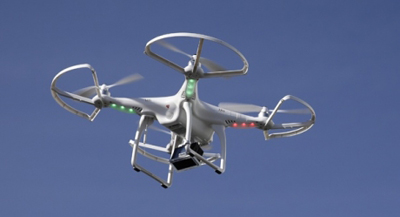Drone Delivery, Unlicensed Spectrum Use, Sent to Senate Floor
WASHINGTON—Lawmakers have agreed on rules that would open the door to package delivery and the potential use of unlicensed spectrum by drones. The Senate Commerce Committee this week passed its version of a bill to fund the Federal Aviation Administration through 2017.

The bill, S.2658, was passed out of the committee with 53 amendments. One from Chairman Sen. John Thune (R-S.D.) and Ranking Member Sen. Bill Nelson (D-Fla.) calls for the creation of a drone traffic management system, and directs several federal agencies to determine what spectrum drones should be allowed to use. The amendment instructs the agencies to establish if drones should be allowed to use frequencies on an “unlicensed, shared or exclusive basis” within the aviation band or elsewhere on the spectrum.
Another, submitted by Sens. Dean Heller, (R-Nev.) and Maria Cantwell, (D-Wash.), would authorize drone-based package delivery. The amendment gives the Secretary of Transportation two years to “issue a final rule authorizing the carriage of property by operators of small, unmanned aircraft systems for compensation or hire within the United States.”
The portion of the full bill that addresses unmanned aerial systems begins with a “sense of Congress” regarding privacy. A sense of Congress is otherwise considered a firm recommendation. In this case, the bill recommends that businesses using drones for commercial operations have “a written privacy policy” for any “collection, use, retention and dissemination of any data collected” during a drone operation, and that these policies be publicly available.
Any violation of this policy would fall under the purview of the Federal Trade Commission’s deceptive practices laws.
The bill directs the National Telecommunications and Information Administration—an agency within the Commerce Department—to develop a report on best practices “developed through multi-stakeholder engagement” on “unmanned aircraft systems transparency and accountability” for commercial drone use. The NTIA report is to include recommendations for encouraging commercial drone users to adopt privacy policies. It would be due by the end of July.
The legislation also directs a multi-agency contingent led by the director of the National Institute of Standards and Technology to develop a system for identifying drones within a year of the bill’s passage.
The FAA now has a system in place requiring the registration of all drones weighing more than 0.55 pounds and less than 55 pounds, whereby each is assigned a number that must be displayed on the aircraft.
In addition, S.2658 calls for a classification system for both public and civil drones, and a searchable database “to further enable the immediate remote identification” of a drone by the general public. Commercial and government users also would be required to maintain records identifying “each person on whose behalf” the drone has been operated, for at least a year.
NIST also is directed to create airworthiness standards for drones within 60 days of the bill’s enactment. These are to include “means to prevent tampering” with mandated safety and identification systems, and ways to bring legacy drones into compliance. Shipment of drones that don’t meet national airworthiness standards will be prohibited.
The legislation also addresses testing, and recommends that the FAA develop a program using its current six drone test sites to ensure the “safe integration” of drones into national airspace. Parameters include development and enforcement of altitude limitations, classification of restricted airspace and related manufacturer warning systems. It also mentions developing technologies for sense-and-avoid, beyond line-of-sight and nighttime operations.
The FAA is directed to submit a progress report on the program every six months through a sunset date of Sept. 30, 2017.
The bill would create special geographic dispensation for permanent, 24/7, beyond line-of-sight drone operation in areas of the Artic, for “research and commercial purposes.”
It is left to the Secretary of Transportation to determine if drone operators will have to have an airman certificate, a medical certificate or a minimum number of hours piloting an aircraft. The FAA does not yet require this, but it also does not yet differentiate commercial and private use. Commercials users now obtain waivers for operating drones. The bill also would allow the FAA to create exemptions for the pilot requirements put in place by the Transportation Secretary.
The bill will next go to a full Senate vote and be resolved with the House version.
February 8, 2016
Drone Rules Wend Through Congress
The bill would create interim guidelines for the commercial drone use and testing, and it would create a deputy administrator responsible for integrating drones into National Air Space.
December 14, 2015
FAA Announces Small UAS Registration Rule
Registration will be a statutory requirement for all aircraft. Under this rule, any owner of a small UAS who previously operated an unmanned aircraft exclusively as a model aircraft prior to Dec. 21, 2015, must register no later than Feb. 19, 2016.
The professional video industry's #1 source for news, trends and product and tech information. Sign up below.
